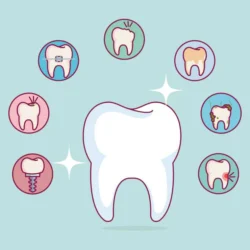Isn’t it true that full-body checkups often overlook the mouth? Is there a valid reason for this? Honestly, the dental fraternity finds none. Professionals for dental care claim that the mouth and its structures are integral to the rest of the body. The mouth serves as the entry point for all types of medications and dietary supplements. Your general health will suffer if the pathway to your gut is unclean! Have you given this a thought?
General physicians and surgeons always seek the opinion of expert dentists for dental care before any invasive procedure. This is especially true for cardiac surgeries. Research has revealed a strong link between heart disease and dental health conditions.
Poor oral health and susceptibility to developing heart disease:
Scientific research has successfully shown that miles away from the mouth, blockages in blood vessels and the valves in the heart have shown remnants of oral bacteria. Yes! That’s right. Unhealthy germs from the mouth can travel from the mouth directly to the heart and grow there to cause serious heart infections, which can be life-threatening.
The link between heart and mouth health:
A healthy mouth is a community of all kinds of bacteria. It is a balanced ecosystem that serves the host in several beneficial ways. When the mouth is dirty due to an ongoing tooth or gum infection, this balance gets disrupted. Few strains of bacteria increase more than others, producing toxins. These toxins cause tooth cavities, gum bleeds, pain, bad breath, and abscesses, and can even travel via oral fluids and blood to other parts of the body.
Gum disease, or periodontitis (caused by periodontal bacteria), in particular, has been shown to have serious consequences for an individual’s overall health.
How does the heart get affected?
- Bacteria that grow on the gums contain deadly toxins in them. Research says that these toxins are carbohydrate-based compounds that are also found in blood vessel blockages.
- All cells of inflammation, particularly white blood cells, are attracted to gum infections and cavities in the teeth. These are also an integral part of cholesterol deposition in heart valves and blood vessels.
- The immune system produces a significant amount of white blood cells in response to gum infections. These frequent waves of inflammation cells harm the overall body’s health.
- Blockages in the heart and blood vessels are due to a buildup of platelets in the blood. The toxins related to gum infections are also a trigger for platelet accumulation!
- Cigarette smoking and electronic cigarettes both precipitate heart diseases and poor gum conditions, aggravating dental infections, high blood pressure, and snowballing into compromised heart health.
- Other aggravating factors include high cholesterol (a high-cholesterol diet, such as fried foods and junk), hypertension, and diabetes. Low-density lipoproteins (LDL), or bad cholesterol, can build up in the major arteries and veins, obstructing blood flow to the heart.
Oral signs to watch out for to avoid any complications of the heart:
- Frequent episodes of gum bleeding.
- Salty taste in the mouth
- Gum pimples/gum abscesses
- Tender sore red gums
- Bad breath
- Sensitivity to cold, sweets, and sour.
- Receded gums and tooth-root exposure
- Shaking teeth
- Rampant cavities
- Valve replacement surgery
- Stent placement surgery in the heart
- Pacemaker installation
- Congenital heart disease.
- There is a familial history of heart problems.
- History of high cholesterol, that is persistent even after medication
What are the precautions suggested by professionals for dental care at dental clinics in Dundas region to prevent heart diseases linked to oral health:
- Get regular dental checkups. Maintain the schedules for dental scaling and tooth filling. Teeth cleaning services or scaling is one of the most basic procedures. It results in stronger teeth, healthier gums, and a reduction of bad breath. Do not ignore them, regular gum bleeds can eventually turn into an infection in no time.
- Make sure to brush twice daily. Spend a few minutes in front of the mirror brushing the mouth’s edges and nooks with a gentle soft toothbrush. One way to keep up good oral hygiene is to brush your teeth, which is important for getting rid of bad bacteria. Boost your brushing technique, consume more water, and limit your intake of sugary and fatty foods.
- Remember to keep your tongue clean. This muscle mass in the mouth faces all foods and liquids, regardless of their form or texture. If not cleaned regularly, food residues can initiate fungal infections of the tongue.
- For the best results, Professional dentist in Dundas suggests supplement your daily oral hygiene routine with mouthwash, proxa brushes, and dental floss. Areas in between the teeth and the underneath the gums attract fibrous foods; prolonged accumulation of food is ideal for bacterial colonies.
- Get your vitamin levels and blood sugar checked. Vitamin C deficiency and diabetes are both known to have immediate effects on the gums.
Conclusion
Being diligent with routine health checkups is good, but when you are equally aware of your oral hygiene, it is even better!







